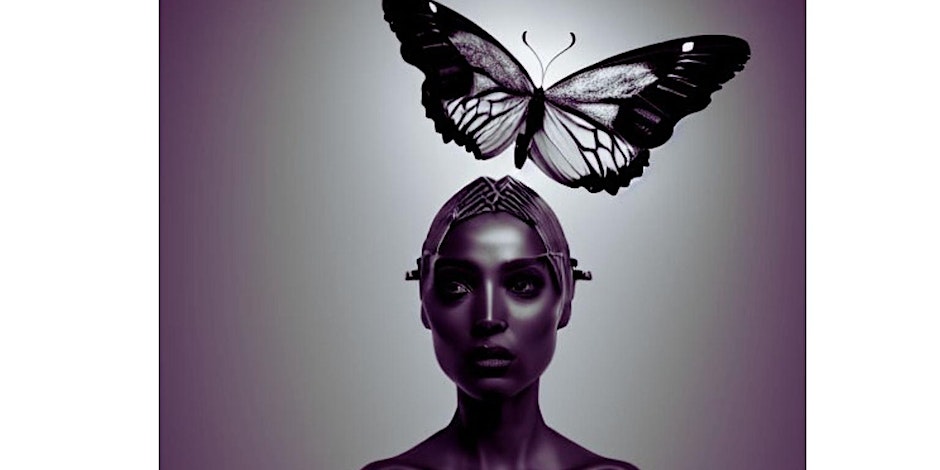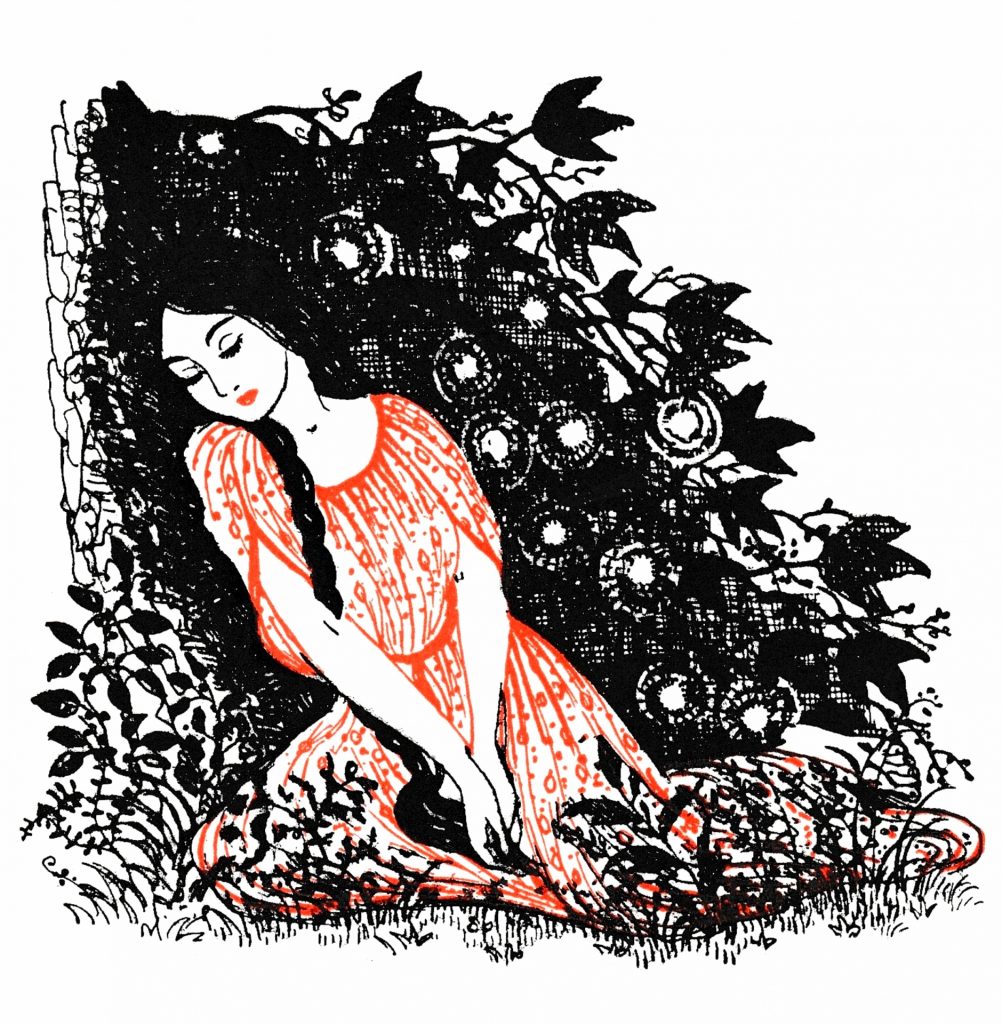To walk on four legs or barefoot and to go through a wall to fall into oneself boneless eviscerated like with a hole in the head through which one could put a transparent finger and touch one's colorless brain the jar has been overflowing with pain I was so sorry for you… then to sit and watch all those atoms being scattered into oblivion drowning deep you should have started by picking up your bones one after the other to build something meaningful with them even fleshless I've heard someone crying in my neighbors’ apartment they don't know who I am anonymous building inhabited by ghosts busy with themselves busy beating up their kids abusing their wives as if they wanted to somehow decry their hollow souls
Category Archives: CHAOS
Poem from Christopher Bernard
Fountain Her hand leaps into the air like spray as she dances, dances through the shadows in the hushed auditorium she wraps around her all the long spring afternoon. She seems to rise in a lover's arms of air and fog and sunlight. Her eyes glimmer, her lips murmur sweet nothings. The hair flows over the brim of her shoulders down her transparent back. Swallows dance in the rain that dazzles from her fingers: she is a living fountain, and drowns all the boys. ____ Christopher Bernard is an award-winning poet, novelist and essayist. His most recent books are the first two stories in the series “Otherwise,” for middle-grade readers: If You Ride A Crooked Trolley . . . and The Judgment Of Biestia.
Haiku from J.D. Nelson
on this extra day the hen leaps down & loses one of her toenails — the first day of March spaghetti marinara & a banana — last week of winter first time I've seen my nephew in almost a year — bio/graf J. D. Nelson’s poems have appeared in many publications, worldwide, since 2002. He is the author of eleven print chapbooks and e-books of poetry, including *purgatorio* (wlovolw, 2024). Nelson’s first full-length collection is *in ghostly onehead* (Post-Asemic Press, 2022). Visit his website, MadVerse.com, for more information and links to his published work. His haiku blog is at JDNelson.net. Nelson lives in Boulder, Colorado, USA.
Poetry from Anna Petrovic
Silence
Quiet… the vastness strides with a silent pace,
whispers await, in secrecy.
Stars tremble, awaiting the sanctity’s blaze,
before the waves, hush your voice silently.
It is a wave of silence deep,
human echoes yearning behind him.
In sacred cup, where secrets repose,
unspoken words strive to redeem.
Chaos whispered in the silence,
guard… eternity and transience struggle.
Inkiness is seeking my compliance,
redemption screams, growing vaster.
Silent plea! May peace resurrect .
let wrath shatter in the hush of light.
In the mirror of dusk, hopes reflect,
in the soft twilight’s tender might.
The beginning and the end! Glory to them,
let the chant sing like a sparkling lullaby,
like mother’s face that you can’t forget,
Prayer chants with the endless sky.
Glory to silence, herald of grace,
it waves shattered strands.
In enchanting depth, like a distant glance,
where last shall be first and first shall be last.
Storm
A storm is brewing, in the heart chaos reigns,
Noise dances wild everywhere,
The vessel, delight for timeless wanderer,
Is gliding to my soul carrying an embrace.
A depth of grief in the vast expanse,
without its shield, tears veil the path,
Sorrow emboldens the army of darkness,
captive of tears has no more tears left.
The past, a blade to the stumbling heart,
lifts the veil upon the soul’s capture,
tears are ticking away fast,
none can endure, a silent rapture.
I’m an exile of the infernal mill,
redeemed by majestic grandeur,
before the emperor’s crown… I stand still
it shines marvelous in its splendor
Unnamed song
At the limen of time,
I stand as a stranger
Here, might doesn’t intertwine
soul is a tireless passenger.
We need light, glow of glances,
human heart forgiveness,
we’re yearning a sip of repose,
seeking solace in the stillness.
Weary of darkness, we seek dawn,
I seek those eyes, precious of mine,
woken from the dead, seeking the forgotten
shadow beside me, companion of time.
Though sawn wood whispers time’s embrace,
each grain a tale, a memory traced.
Moments linger like echoes,
In the music of a rhyme as eternity grows.
Ana Petrovic was born on 05.02.1985 in Serbia, where she currently lives. She wrote a book of poems, but it is not yet published She finished medical school, VI degree. Many songs of hers are published in magazines and portals. Some of them are translated into English. She has been working on special programs with kids who have paralysis cerebralis. She likes working with kids as much as she likes poetry.
Synchronized Chaos First March Issue 2024: Literary Devices
We continue to express sorrow over what’s happening in so many different parts of the world and encourage our readers to support people and the planet.

Also, we are hosting our Metamorphosis gathering again! This is a chance for people to share music, art, and writing and to dialogue across different generations (hence the name, the concept of ideas morphing and changing over the years). This event is also a benefit for the grassroots Afghan women-led group RAWA, which is organized by women in Afghanistan who are currently supporting educational and income generation and literacy projects in their home county as well as assisting earthquake survivors. (We don’t charge or process the cash, you are free to donate online on your own and then attend!)
This will be Saturday April 6th, 2-4 pm in the fellowship hall of Davis Lutheran Church at 317 East 8th Street in Davis, California. It’s a nonreligious event open to all, the church has graciously allowed us to use the meeting room. You may sign up here on Eventbrite.
Also, we encourage everyone in the California area to attend the third annual Hayward Lit Hop on Saturday, April 27th. This is a public festival with different readings from different groups throughout downtown Hayward coinciding with Hayward’s choosing a new adult poet laureate, culminating in an afterparty at Hayward’s Odd Fellows Lounge. Several Synchronized Chaos contributors will read from their work at the 2024 Lit Hop.
Now for the March 2024 issue, Literary Devices. This issue explores what we can accomplish with language. The written and spoken and signed word can be a force for education, communication, dignity, connection among people, and pride and artistry. Language is also a way to render the indescribable through metaphor or fragmented text and leave something behind on the historical record.

Maurizio Brancaleoni reflects on human history as if it were akin to fossils, engraved within stone. S. Rupsha Mitra’s poetry collection Smoked Frames, reviewed here by Cristina Deptula, dramatizes the search for one’s truest self within psychology, cultural and family history, and radical self-understanding.
On a more personal level, John Edward Culp celebrates the anticipatory joy of the first tentative flight of new love. Kristy Raines writes of the emotional union and connection of romance.
Graciela Noemi Villaverde evokes dreamy flights of fancy, memory and imagination. Borna Kekic reminisces about his old haunts and watching movies with his teenage friends.
Duane Vorhees presents a poetic and historical record that chronicles the slow dissolution of a relationship while Taylor Dibbert’s poem reflects on the stages of the inevitable dissolution of a marriage and Elmaya Jabbarova speaks to a keenly felt grief, an absence that’s like a presence.

Saidakbar Ibrohim’s essay focuses on Uzbek poet G’afur G’ulom, Yahya Azeroglu’s work chronicles Azerbaijani literary and cultural history and pride while Z.I. Mahmud analyzes the literary and poetic qualities of Rabinadranath Tagore and Anita Desai’s poetry and prose.
Munisa Azimova offers up praise for the legacy of Uzbek poet Alisher Navoi and Bakhara Shodmonqulova shows respect for her heritage and language while Janglish Khasanova describes efforts to collect and publish the works of young Uzbek writers today. Mohichehra Rustamova’s essay highlights the love of her parents and the beauty and wisdom of her country’s literary heritage. Jacques Fleury celebrates part of Black global literary history through his review of Zora Neale Hurston’s Their Eyes Were Watching God, which tells the story of a Black woman’s journey towards self-realization independent of society’s emphasis on upward mobility and respectability.
Gulyora Hashimjonova offers up a memory of connection between herself and her father out in nature in their Uzbek homeland. Don Bormon celebrates humans and nature in his elegant piece on life in a city park while Mahbub Alam illustrates the cycles of nature, the trees changing colors, Annie Johnson contributes gentle poems about love and the slow sunrise and J.K. Durick offers up various takes on human and natural history and questions our level of control over shaping our world. Noel Pratt reflects on nature and on our smallness and relative lack of influence over such a large and eternal world. J.D. Nelson draws on haiku, the traditional Japanese form often used to depict glimpses of the beauty of nature, to craft vignettes about embracing ordinary life, even when plans are interrupted. Doug Hawley’s humorous short pieces illuminate human life and human nature and highlight the importance and ingrained nature of our instinct to narrate life through story.
Christopher Bernard reviews Cal Performances’ recent production of Pina Bausch’s take on Stravinsky’s The Rite of Spring, a show grounded in connection to the cycles of the earth.
Durdona Roxmatullayeva writes of the isolation and harshness but also the natural quality of heartbreak, metaphorically represented by the season of winter, while Zarnigor Ubaydullayeva extols the beauty of spring, kindness, and maturity. Mesfakus Salahin laments large scale damage to the earth and the world’s ecosystems.

Isabel Gomez de Diego photographs large tractors on parade in front of historic buildings, showing off the interdependence of agriculture and industry.
Marjona Asadova hopes for national Uzbek pride and world peace through universal recognition of human dignity. Maja Milojkovic’s poetry concerns our ethical aspirations, encouraging us to summit the heights of becoming more decent and caring human beings.
Dusan Stojkovic speaks to the role of poetry in teaching people to navigate life and relationships while Mykyta Ryzhykh highlights the psychological effects of dehumanization and cheapening of life, human and nonhuman.
Set within middle America, Bill Tope’s story looks at how we find closeness to each other, while Stephen Jarrell Williams’s poetry explores where and how we find solace, together or alone.
Anna Petrovic’s poems navigate the landscape of intense human feeling. Sa’ad Ali’s ekphrastic poems evoking the sensibility of lesser known works by famous artists. Iduoze Abdulhafiz probes the psychology of people’s dreamlike subconscious while Joshua Martin scatters letters and punctuation on the page in concrete poetry and Clive Gresswell’s pieces offer up ruminations in rhythmical streams of consciousness while Mark Young connects fragments of thought using technology and Jim Meirose explores the experience of falling through experimental words and text. Patrick Sweeney’s one-line poems are at once familiar and exotic, esoteric and mundane.

Makfiratkhon Abdurakhmonova extols the virtues and possibility of the land of sleep. Sayani Mukherjee‘s poetry concerns a dreamtime encounter with the divine world beyond herself while Madinabonu Bobobekova offers up a dreamy meditation on getting into the headspace to write.
Emeniano Acain Somoza compares the human heart navigating life to the performance of a juggling clown.
Ayanda Dlanga’s horror piece on fear and pursuit from a monster at night could be a metaphor for growing up too quickly. Safarmurod Yuldoshev speaks to the distribution of phytonematodes in Uzbekistan’s crops in his scientific essay, illustrating how nature can be menacing as well as welcoming. Jerry Langdon speaks to the physical and psychological horrors waiting for and threatening our souls, while Daniel De Culla addresses external political oppression through his poetic dramatization of a corrupt and self important Argentine leader.
J.J. Campbell contributes fatalistic poetry about a suffocating small town while Shahrizoda Bekturdieva raises awareness of domestic violence in a variety of locales. Mirta Liliana Ramirez writes of finding her own voice and speaking up for herself and others who were wronged, while Shamisya Khudoynazarova Turumnova addresses the pain associated with shattering a person’s reputation and Ilhomova Mokhichera reflects on the inexplicability of heartbreak.
Roberta Beach Jacobson’s poems are of awkwardness, not fitting in life, while Kelly Moyer’s work represents the self-described fantasy of finally being noticed and heard. Faleeha Hassan links war and violence to the human survival instinct, stemming from a desperate and human need to be heard and validated.

Lilian Dipasupil Kunimasa addresses our freedom of choice, between good and evil or simply between different life paths. Nahyean Bin Khalid gives us the beginning of a good versus evil action tale while Gulsanam Qurbonova praises the value of continual knowledge and self-education and Azamqulova Shahina Jonibekovna talks about upbringing, education, and development as a person while Madina Fayzullaeva outlines the intellectual and personal core competencies needed to teach foreign language and Mavludaxon Moydinova’s essay describes language and word formation in the Uzbek language. Sarvinoz Mamadaliyeva outlines and celebrates educational opportunities available to young Uzbeks at Namangan State Pedagogical University.
Adhamova Laylo Akmaljon gives us an essay on achieving goals and making the most of life. Zinnira Maxammadiyeva talks about making the most of life by investing in yourself and studying as Gulsevar Xojamova urges her fellow Uzbeks to pursue education and personal responsibility.
Shahnoza Ochildiyeva presents her pathway to success as a strong and creative Uzbek girl, while Orzigul Sherova offers up her praise of science and research and learning and knowledge. Guli Jonuzoqova describes the value of education, especially for women, while Nurmanatova Aigul’s metaphorical conversational piece concerns moving forward into the future.
Ravshanbek Nasulloyev describes techniques for enhancing one’s learning and everyday skills with a foreign language while Gulyora highlights the importance of cross cultural understanding in useful business communication.

Unlike many who bemoan people’s isolation due to too much screen time, Wazed Abdullah celebrates the connective power of mobile phone technology. Marguba Lapasova describes advances in modern payment technology while Maftuna Umaraliyeva explores how the modern tourism industry has incorporated or expanded upon traditional codes of hospitality.
Shakhnoza Ulashova argues for enhancing justice in Uzbekistan by providing Uzbeks with representation in all sorts of legal proceedings.
Umid Qodir’s poem asserts the value and dignity of poetry in advancing human understanding while Jullayeva Sitora Ismailnova highlights how the true heart of a poet should tend towards empathy and compassion.

Nosirova Gavhar speaks to her devotion in her faith while Brian Barbeito offers up sketches of people who are humble yet wise.
We at Synchronized Chaos Magazine, aspire to be humble, yet wise.
The song “Wherever I Fall,” from the 2021 movie Cyrano, directed by Joe Wright, shares the experiences of soldiers who believe they will likely die soon, yet express to their families and loved ones that they are happy with how they are living their lives, given the power and the choices available to them. We hope that Synchronized Chaos embodies that ethic, that we and our contributors and our readers are making the most of all of our lives within what is available to us.
Poetry from Jullayeva Sitora Ismailovna

The heart of the poet The poet's heart does not want evil He seems to consider the enemy as a friend Turns bad into good Best wishes come true The poet's heart does not want evil He doesn't chase an elusive dream A wish becomes a goal If you live without a purpose your heart does not want separation So that tears don't flow from these cups No one should suffer the pain of separation Let them endure every pain with patience The heart of the poet advocates goodness May this bright world become heaven May all good intentions be answered.
Essay from Gulyora
Cross cultural communication
Annotation: This article illustrates a several number of opinions about the cross-cultural communication , in different parts of world
Key words: Cross-culture, communication, endeavor, investigating, geographies, intercultural
Cross-cultural communication is a field of study investigating how people from differing cultural backgrounds communicate, in similar and different ways among themselves, and how they endeavor to communicate across cultures. Intercultural communication is a related field of study. Often referred to as intercultural communication, cross-cultural communication is the study of how verbal and nonverbal communication takes place among individuals from different backgrounds, geographies, and cultures.
As you can see, the definition is very straightforward, but learning how to implement cross-cultural communication into your career is not as black and white. Communication is also the core of publishing statements to broad audiences, monitoring all communication coming from clients, and preparing stakeholders for the worst are all duties of a PR professional.
With the globalization of businesses, PR professionals, in particular, must learn about cross-cultural communication and its impact on the PR industry so they don't make the mistake of misrepresenting a culture.
It is important to note before diving into the details of cross-cultural communication that there are cultural generalizations that do not account for specific individuals in a culture. For example, different countries around the world interpret hand gestures in different ways.
Since cross-cultural communication is how people belonging to different cultures communicate with each other, there are bound to be clashes between different cultures. One tactic to reduce these clashes is prioritizing diversity when hiring. When people from differing cultures work toward a common goal, the risk of offensive misunderstandings decreases, and the quality of work increases.
Communication is the exchange of meaning: it is my attempt to let you know what I mean. Communication includes any behavior that another human being perceives and interprets: it is your understanding of what I mean. Communication includes sending both verbal messages (words) and nonverbal messages (tone of voice, facial expression, behavior, and physical setting). It includes consciously sent messages as well as messages that the sender is totally unaware of sending. Whatever I say and do, I cannot help communicating. Communication therefore involves a complex, multilayered, dynamic process through which we exchange meaning.
Every communication has a message sender and a message receiver. The sent message is never identical to the received message. Why? Communication is indirect; it is a symbolic behavior. Ideas, feelings, and pieces of information cannot be communicated directly but must be externalized or symbolized before being communicated. Encoding describes the producing of a symbol message. Decoding describes the receiving of a message from a symbol. The message sender must encode his or her meaning into a form that the receiver will recognize-that is, into words and behavior. Receivers must then decode the words and behavior - the symbols - back into messages that have meaning for them.
For example because the Cantonese word for “eight” sounds like jaat, which means prosperity, a Hong Kong textile manufacturer Mr. Lau Ting-pong paid $5 million in 1988 for car registration number 8. A year later a European millionaire paid $4.8 million at Hong Kong’s Lunar New Year auction for vehicle registration number 7, a decision that mystified the Chinese, since the number 7 has little significance in the Chinese calculation of fortune. Translating meanings into words and behaviors - that is into symbols - and back again into meanings is based on a person's cultural background and is not the same for each person. The greater the difference in background between senders and receivers, the greater the difference in meanings attached to particular words and behaviors.
Cross-cultural communication occurs when a person from one culture sends message to a person from another culture. Cross-cultural miscommunication occurs when the person from the second culture does not receive the sender's intended message. The greater the differences between the sender's and the receiver's cultures, the greater the chance for cross-cultural miscommunication.
Communication does not necessarily result in understanding. Cross-cultural communication continually involves misunderstanding caused by misperception, misinterpretation, and misevaluation. When the sender of a message comes from one culture and the receiver from another, the chances of accurately transmitting a message are low. Foreigners see, interpret, and evaluate things differently, and consequently act upon them differently. In approaching cross-cultural situations, one should therefore assume difference until similarity is proven. It is also important to recognize that all behavior makes sense through the eyes of the person behaving and that logic and rationale are culturally relative. In cross-cultural situations, labeling behavior as bizarre usually reflects culturally based misperception, misinterpretation, and misevaluation; rarely does it reflect intentional malice or pathologically motivated behavior. Unwritten rules reflect a culture's interpretation of its surroundings.
CROSS-CULTURAL MISPERCEPTION No two national groups see the world in exactly the same way. Perception is the process by which each individual selects, organizes, and evaluates stimuli from the external environment to provide meaningful experiences for himself or herself. Perceptual patterns are neither innate nor absolute. They are selective, learned, culturally determined, consistent, and inaccurate. • Perception is selective. At any one time there are too many stimuli in the environment for us to observe. Therefore, we screen out most of what we see, hear, taste, and feel. We screen out the overload and allow only selected information through our perceptual screen to our conscious mind. • Perceptual patterns are learned. We are not born seeing the world in one particular way. Our experience teaches us to perceive the world in certain ways. • Perception is culturally determined. We learn to see the world in a certain way based on our cultural background. • Perception tends to remain constant. Once we see something in a particular way, we continue to see it that way. • We therefore see things that do not exist, and do not see things that do exist.
Our interests, values, and culture act as filters and lead us to distort, block, and even create what we choose to see and hear. We perceive what we expect to perceive. We perceive things according to what we have been trained to see, according to our cultural map. The distorting impact of perceptual filters causes us to see things that do not exist.
Interpretation occurs when an individual gives meaning to observations and their relationships; it is the process of making sense out of perceptions. Interpretation organizes our experience to guide our behavior. Based on our experience, we make assumptions about our perceptions so we will not have to rediscover meanings each time we encounter similar situations. For example, we make assumptions about how doors work, based on our experience of entering and leaving rooms; thus we do not have to relearn each time we have to open a door. Similarly, when we smell smoke, we generally assume there is a fire. Our consistent patterns of interpretation help us to act appropriately and quickly within our day-to-day world. Categories Since we are constantly bombarded with more stimuli than we can absorb and more perceptions than we can keep distinct, we only perceive those images that may be meaningful. We group perceived images into familiar categories that help to simplify our environment, become the basis for our interpretations, and allow us to function in an otherwise overly complex world.
Categories of perceived images become ineffective when we place people and things in the wrong group. Cross-cultural miscategorization occurs when I use my home country categories to make sense out of foreign situations. Stereotypes Stereotyping involves a form of categorization that organizes our experience and guides our behavior toward ethnic and national groups. Stereotypes never describe individual behavior; rather, they describe the behavioral norm for members of a particular group. Stereotypes, like other forms of categories, can be helpful or harmful depending on how we use them. Effective stereotyping allows people to understand and act appropriately in new situations. A stereotype can be helpful when it is • Consciously held. The person should be aware that he or she is describing a group norm rather than the characteristics of a specific individual. • Descriptive rather than evaluative. The stereotype should describe what people from this group will probably be like and not evaluate those people as good or bad. • Accurate. The stereotype should accurately describe the norm for the group to which the person belongs. • The first best guess about a group prior to having direct information about the specific person or persons involved.
Modified, based on further observation and experience with the actual people and situations. A subconsciously held stereotype is difficult to modify or discard even after we collect real information about a person, because it is often thought to reflect reality. If a subconscious stereotype also inaccurately evaluates a person or situation, we are likely to maintain an inappropriate, ineffective, and frequently harmful guide to reality. Managers ranked "most internationally effective" by their colleagues altered their stereotypes to fit the actual people involved, whereas managers ranked "least internationally effective" continued to maintain their stereotypes even in the face of contradictory information. To be effective, international managers must therefore be aware of cultural stereotypes and learn to set them aside when faced with contradictory evidence. They cannot pretend not to stereotype. If stereotyping is so useful as an initial guide to reality, why do people criticize it? The answer is that we have failed to accept stereotyping as a natural process and have consequently failed to learn to use it to our advantage.
For years we have viewed stereotyping as a form of primitive thinking, as an unnecessary simplification of reality. We have also viewed stereotyping as immoral: stereotypes can be inappropriate judgments of individuals based on inaccurate descriptions of groups. It is true that labeling people from a certain ethnic group as "bad" is immoral, but grouping individuals into categories is neither good nor bad-it simply reduces a complex reality to manageable dimensions. Negative views of stereotyping simply cloud our ability to understand people's actual behavior and impair our awareness of our own stereotypes.
Bibliography:
ADLER J. N. (1991) International Dimensions of Organizational Behaviour. 2nd ed. PWS-KENT Publishing Company.
Beamer L., & I.Varner (2001) Intercultural Communication in the Global Workplace. 2nd ed. N.Y.: McGraw-Hill.
Condon, J.C. & Yousef. F.S. (1975). Introduction to intercultural communication. New York: Bobbs-Merrill Company.
Gudykunst, W. B., & Kim, Y. Y. (1992). Communicating with strangers: An approach to intercultural communication (2nd ed.).
New York: McGraw-Hill, Inc. Hall, E.T. (1959). The silent language. Garden City, NY: Anchor Press/Doubleday. Lewis, R.( 1997) When Cultures Collide, Doubleday.
